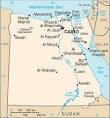US Favors Military Rule in Egypt
Interview with Abayomi Azikiwe

Abayomi Azikiwe, editor of the Pan-African Newswire from Detroit, has joined Press TV’s Debate to discuss the trial of Egypt’s first democratically elected president.
What follows is a rough transcription of the interview.
Press TV: Mr. Azikiwe, would you say that what happened in Egypt was not a coup d’état and would you not agree with the statement being made by Mohamed Morsi that he is the constitutional president of the country still?
Azikiwe: In my opinion it was a coup d’état that took place on July 3 earlier this year. It was not the people who were demonstrating against Morsi’s policies that was a decisive factor in the termination of his [tenure in] office. It was the military and the security forces which stormed his office, which refused to take his orders, which took him into custody.
It was they which has held him in detention now for over four months, against his will and also we have seen the deaths of hundreds of people, some Muslim Brotherhood supporters say thousands of supporters of President Morsi, and at this point there is no due process for the president or members of the Muslim Brotherhood and the organization itself has been banned.
So I do not see how anyone observing the situation in Egypt could say that it was not a coup d’état.
Press TV: Mr. Azikiwe, before we run out of time, let us look at the role that the international community on Egypt, right now, is playing.
We are seeing very different positions being voiced from the United States. What do you think the role of the US could be? We are not even sure if the US is completely backing the military-led government.
Azikiwe: We believe that the United States is backing the military government. Secretary of State John Kerry was just in Cairo, over the weekend, and he said that the suspension of aid by the United States to Egypt was a temporary measure and that not all the aids had been suspended.
He mentioned several categories of assistance but they said that they were going to maintain relations with Egypt and that aid was only one aspect of relations between the United States and Egypt.
So the US, in effect, coming to Egypt on the eve of this trial that is going on right now – which is a show trail – in effect is supporting what the military is doing in Egypt but it makes sense from the standpoint of the three-decades-long relationship between the US intelligence, military as well as the Egyptian army.
Press TV: Would you say Mr. Azikiwe that the United States is right now, then, backing the military and all that the military is doing?
Some people are saying that the United States is actually very concerned now about the fact that the military is getting a bit suppressive and is acting in a way that it is not getting the backing of the public.
Azikiwe: They realized that there is going to be continuing unrest inside of the country. Today they have 20,000 police and military forces on the streets to prevent demonstrations, but there are still clashes that are going on in various parts of the country.
Therefore, the United States is concerned about maintaining the stability in Egypt but they will prefer to deal with this military-backed government rather than dealing with the democratic system in Egypt, which they may not be in full and total control of.

